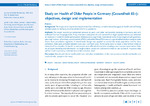Study on Health of Older People in Germany (‘Gesundheit 65+’): objectives, design and implementation
Fuchs, Judith
Gaertner, Beate
Perlitz, Hanna
Kuttig, Tim
Klingner, Annett
Baumert, Jens
Hüther, Antje
Kuhnert, Ronny
Wolff, Julia
Scheidt-Nave, Christa
Study Group 'Gesundheit 65+'
Background: The longitudinal population-based study Gesundheit 65+ aimed to close data gaps on health and well-being
of older adults in Germany in times of the COVID-19 pandemic.
Methods: The target population comprised persons 65 years and older permanently residing in Germany and with
sufficient German language skills. Proxy interviews were possible and consent from legal representatives was obtained
as necessary in order to enable participation of physically or cognitively impaired persons. A two-stage sampling process,
was used to draw 128 primary sample points (PSUs) and within these PSUs sex- and age-stratified random samples were
drawn from population registries. A mixed-mode design was applied to contact the study population and for data
collection. Data were collected between June 2021 and April 2023. Participants were surveyed a total of four times at
intervals of four months. At month 12 participants were offered a home visit including a non-invasive examination. Data
on all-cause mortality and information on neighborhood social and built environment as well as health insurance data
will be linked to primarily collected data at the individual level.
Discussion: Results will inform health politicians and other stakeholders in the care system on health and health care
needs of older people in Germany.
Dateien zu dieser Publikation

